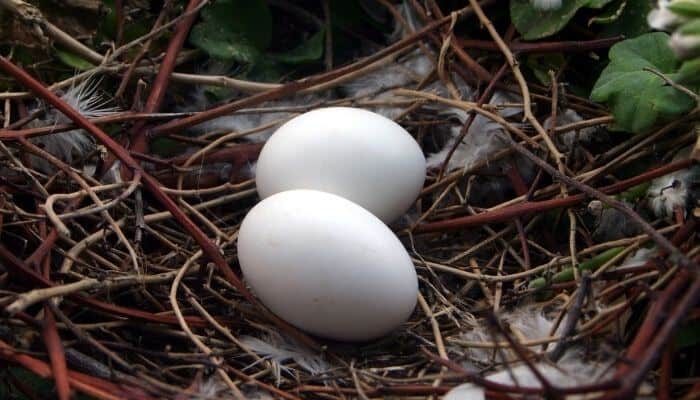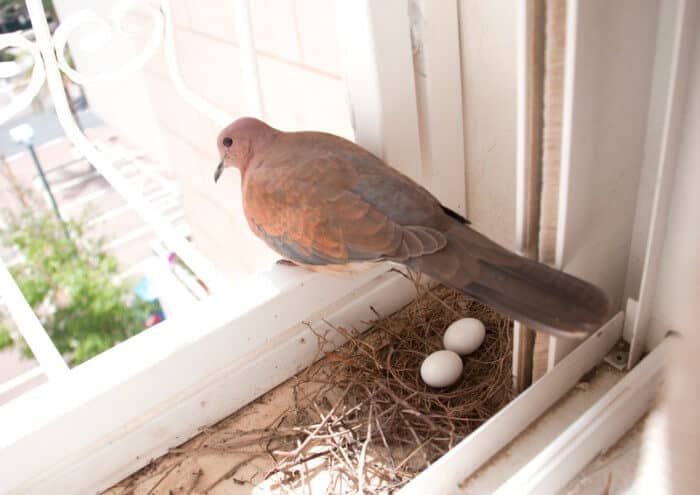Hungry pigeons will eat eggs as a last resort when no other food source is available.
The Real World and the Food Chain
We all know that the animal kingdom is pretty much a case of dog eat dog across the board for survival of the fittest, but when it comes to avian creatures, does a ‘bird eat bird’ mentality exist as well?
In several different regions across several different breeds and species, large birds of prey will pick off smaller birds for a quick and easy meal, and the same can be said for birds that are much closer in size but not necessarily evenly matched for battle like seagulls and pigeons.
Does the same pattern occur, however, when you apply the bird eat bird analogy to their eggs?
The answer is yes, but there are a few different factors to consider if you want to get a full picture of the situation.
Do Pigeons Eat Their Own Eggs?
Pigeons will eat their own eggs if they have to.
It is not regular behaviour but circumstantial.
It will happen during a hard winter or extreme weather when there are very few or no food sources.

These circumstances are only applicable to wild pigeons. It is extremely unlikely that a domesticated pigeon will ever need to eat its own eggs.
Eggs are highly nutritious and will provide an excellent source of the nutrients and vitamins a pigeon needs.
If a pigeon is near starvation, its survival instincts will kick in and it will break open and eat one of its own eggs.
If it needs to, a pigeon parent will sacrifice one of its eggs in order to gain the nutrition it needs in order to continue looking after and protecting its remaining eggs.
Do Pigeons Eat Other Bird Eggs?
A pigeon has the capability of swooping in to steal eggs of another bird if it absolutely needs to, but having said that, this is not an activity that pigeons are particularly well known for.
On the whole, a wild pigeon is a very docile bird compared to other breeds.
Corvids, for example, are well-known nest raiders.
Crows, magpies, jackdaws, rooks, ravens and jays are fast, active birds who will regularly rob nests of their eggs, but for pigeons, this isn’t something that they are naturally inclined to do.
A hungry wild pigeon is much more likely to forage on a woodland floor for things like grains, berries, fruits, greens, insects and seeds than to make the effort to steal nest eggs.
Add to this the fact that in general, the diet of a pigeon is granivorous, so they do not have a natural inclination to add eggs to their daily meals.
Last Resort Behaviour
That being said, it is not completely beyond the realms of pigeon behaviour to resort to stealing and eating eggs, because ultimately they will do anything and everything they can to survive.
If none of the pigeon’s preferred food options are available, and the chance to take an egg presents itself, rest assured that the pigeon will gladly accept the challenge!
Pigeons are not humans; they do not connect the emotion of an unhatched egg being the young of another animal, they just see a potential type of food that might be able to provide them with sustenance.
Eggs might not be a natural part of a pigeon’s diet, but they aren’t harmful to their systems in any way.
The nutrients in an egg can prove to be a great, beneficial addition to the pigeon diet, and it is not beyond evolution to develop a more natural tendency for eating them on a regular basis.
Do Pigeons Destroy Eggs?
They will eat them if they are desperate, both their own and those of others, but are there any circumstances in which a pigeon will deliberately destroy the eggs of another bird without the intention of using them for food?
The answer to this query is that it is very unlikely, probably even more unlikely than the pigeon taking eggs to eat. Animals are not emotionally impulsive like humans are, and they only perform actions for what we would call ‘good reasons’.

Destroying a set of eggs that they are not planning to actually eat is something that isn’t associated with normal pigeon behaviour.
They are not specifically territorial like some other breeds, so the only real reason why a pigeon would ever attack another pigeon’s or other breeds’ nest is if they really needed to gain the nutrients that the eggs would provide.
In conclusion, a pigeon will on occasion be tempted to eat eggs from a nest that isn’t its own, but this will always be as a result of extreme hunger and need on the birds’ part.
It’s not a natural part of their behaviour, and there are many other food sources that they will attempt to seek out first!
